
JOURNAL OF MATHEMATICAL SOCIOLOGY
metrics 2024
Exploring Social Dynamics Through Mathematical Lenses.
Introduction
JOURNAL OF MATHEMATICAL SOCIOLOGY, published by Taylor & Francis Inc, is a vital forum for interdisciplinary research at the intersection of mathematics and sociology, offering a unique perspective on social phenomena through mathematical analysis. Established in 1971, this esteemed journal is continuously evolving, with convergence through 2024, reflecting its commitment to advancing the field. With an ISSN of 0022-250X and an E-ISSN of 1545-5874, it is recognized for its impact in the realm of algebra and number theory, as indicated by its placement in Q3 for 2023. Additionally, it holds Q2 rankings in both Social Sciences (miscellaneous) and Sociology and Political Science, demonstrating its scholarly relevance. With a competitive ranking in Scopus, including a 92nd percentile in Mathematics, this journal caters to researchers, professionals, and students seeking rigorous mathematical tools to illuminate sociological concepts. While currently not open access, it remains a crucial resource for anyone looking to explore the quantitative methodologies that underpin modern sociology.
Metrics 2024
 0.36
0.36 1.30
1.30 1.20
1.20 36
36Metrics History
Rank 2024
Scopus
IF (Web Of Science)
JCI (Web Of Science)
Quartile History
Similar Journals

Journal of Applied Mathematics & Informatics
Transforming Ideas into Algorithms: Where Mathematics Meets Informatics.Journal of Applied Mathematics & Informatics is a peer-reviewed academic journal published by the Korean Society of Computational & Applied Mathematics (KSCAM), focusing on the integration and application of mathematical theories and computational techniques across various domains. Established in 2019, this journal serves as a platform for researchers, professionals, and students to share innovative methodologies, practical applications, and theoretical advancements in fields like analysis, applied mathematics, and computational theory. As a Q4 ranked journal according to the 2023 category quartiles in analysis, applied mathematics, computational mathematics, and miscellaneous mathematics, it provides a valuable, albeit niche, contribution to the academic landscape. While the journal currently operates without open access options, it aims to disseminate quality research to foster collaboration and knowledge exchange within the mathematics and computer science communities. Researchers looking to explore emerging trends and methodologies in applied mathematics and informatics will find an essential resource in this journal, which is based in Daejeon, South Korea.

Proceedings of the Institute of Mathematics and Mechanics
Championing Cutting-Edge Research in Mathematics and MechanicsProceedings of the Institute of Mathematics and Mechanics is a pivotal journal in the field of mathematics, dedicated to the advancement and dissemination of cutting-edge research in various sub-disciplines. Published by INST MATHEMATICS & MECHANICS, NATL ACAD SCIENCES AZERBAIJAN, this journal plays a significant role in bridging local and international research communities. With an ISSN of 2409-4986 and E-ISSN of 2409-4994, it has gained recognition, attaining a Q3 ranking in the Miscellaneous Mathematics category and placing in the 67th percentile on Scopus. Run from 2017 to 2024, the journal serves as an accessible platform for scholars and practitioners, inviting contributions that advance theoretical knowledge and practical applications in mathematics. With an emphasis on quality and innovation, the Proceedings of the Institute of Mathematics and Mechanics stands out as a vital resource for those looking to stay at the forefront of mathematical research and its multifaceted applications in various fields.
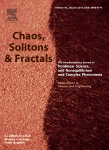
CHAOS SOLITONS & FRACTALS
Advancing Knowledge in Nonlinear DynamicsCHAOS SOLITONS & FRACTALS, published by Pergamon-Elsevier Science Ltd, stands as a premier journal in the fields of mathematical physics, applied mathematics, and nonlinear dynamics. With an impressive impact factor and a 2023 ranking placing it in the Q1 quartile for both applied mathematics and mathematical physics, this journal serves as an essential platform for groundbreaking research and innovative theories that explore the complex interplay between chaos, solitons, and fractal structures. Established in 1991 and converging research until 2024, the journal features rigorous peer-reviewed articles that appeal to academics, professionals, and students alike, facilitating the dissemination of knowledge within a community passionate about statistical and nonlinear physics. Although not open access, its rich content is critical for those seeking to deepen their understanding and advance their work in these dynamic and multifaceted areas of study.
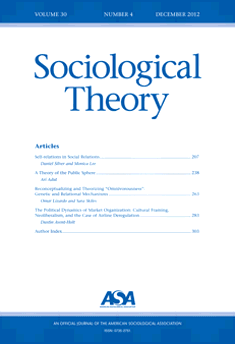
SOCIOLOGICAL THEORY
Elevating sociological discourse with impactful research.Sociological Theory, published by SAGE Publications Inc, is a premier journal dedicated to advancing the field of sociology through innovative theoretical approaches and empirical research. With an impressive impact factor and recognized as a Q1 journal in both Sociology and Political Science, it ranks 86 out of 1466 in its category, placing it in the 94th percentile according to Scopus metrics. This journal seeks to foster rigorous debate and insight on contemporary sociological issues, welcoming contributions that challenge existing paradigms and offer new perspectives. Founded in 1996, Sociological Theory continues to push the boundaries of sociological inquiry through its commitment to quality and relevance, making it an essential resource for researchers, professionals, and students alike. Based in the United Kingdom, this journal is not an open-access publication, but it remains widely accessible through institutional subscriptions, ensuring that its valuable content reaches a global audience interested in the dynamics of social life.

Research in Mathematics
Exploring diverse mathematical landscapes with cutting-edge research.Research in Mathematics, published by TAYLOR & FRANCIS LTD, is an emerging academic journal dedicated to advancing the field of mathematics through innovative research and scholarship. With an E-ISSN of 2768-4830, this journal aims to foster discussion and dissemination of high-quality mathematical research across a broad spectrum of disciplines, including pure mathematics and applied mathematics. As part of its commitment to accessibility, Research in Mathematics operates on an open-access model, allowing researchers, professionals, and students to engage with groundbreaking studies without barriers. Despite its recent establishment since 2016, and with a current Scopus ranking that positions it in the lower percentile among its peers, the journal offers a platform for new voices in the mathematics community. Its objectives include enhancing visibility for novel mathematical concepts, methodologies, and applications that can significantly impact the academic and professional landscapes. Authors are encouraged to submit original research articles, review papers, and case studies that push the boundaries of mathematical knowledge.

DISCRETE AND CONTINUOUS DYNAMICAL SYSTEMS-SERIES B
Advancing Knowledge in Discrete and Continuous SystemsDISCRETE AND CONTINUOUS DYNAMICAL SYSTEMS-SERIES B, published by the American Institute of Mathematical Sciences (AIMS), is a premier journal in the fields of Applied Mathematics and Discrete Mathematics and Combinatorics. With an ISSN of 1531-3492 and an E-ISSN of 1553-524X, the journal addresses significant advances in the mathematical sciences, particularly focusing on the analysis of dynamical systems through discrete and continuous approaches. As recognized in the 2023 Scopus ranks, it holds a commendable position, being classified in the Q2 category for both its mathematical domains, reflecting its high-quality publications and substantial impact on ongoing research. With a converged publication timeline from 2001 to 2025, the journal plays an essential role in facilitating innovative mathematical discourse, making it an invaluable resource for researchers, professionals, and students eager to explore the latest developments and applications in this dynamic field. Although specific open access options are not currently stated, the journal remains committed to disseminating valuable content for those passionate about the intricacies of mathematical systems.
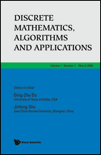
Discrete Mathematics Algorithms and Applications
Unraveling the Complexities of Algorithms and Applications.Discrete Mathematics Algorithms and Applications, published by World Scientific Publishing Co Pte Ltd, stands as a pivotal resource in the field of discrete mathematics and combinatorics since its inception in 2009, with a convergence period extending to 2024. The journal holds an esteemed position within its category, ranked in the Q3 quartile according to latest metrics, recognized for its qualitative contributions to the academic community. With an ISSN of 1793-8309 and an E-ISSN of 1793-8317, it serves as a vital conduit for disseminating innovative research focused on algorithms and their applications within discrete mathematics. Although currently not an open access journal, it provides access to valuable insights and findings that are crucial for researchers, professionals, and students seeking to advance their understanding and application of discrete mathematical concepts. Based in Singapore, the journal continues to promote rigorous scholarly discourse and is a key publication for those involved in advancing the discipline.
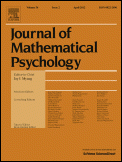
JOURNAL OF MATHEMATICAL PSYCHOLOGY
Enhancing Psychological Literacy through Quantitative ExplorationJOURNAL OF MATHEMATICAL PSYCHOLOGY, published by Academic Press Inc Elsevier Science, is a premier scholarly journal dedicated to advancing the intersection of mathematics and psychology through rigorous research and innovative methodologies. Since its inception in 1964, this esteemed publication has charted significant developments in both Applied Mathematics and Psychology, consistently ranking in the top quartile (Q1) of its categories as of 2023. With a focus on the application of mathematical techniques to psychological problems, the journal serves as a pivotal resource for researchers and professionals alike, providing insights that enhance understanding of cognitive processes and behavioral phenomena. Researchers can access a wealth of articles that reflect the latest trends and inquiries in the field, making this journal an essential tool for advancing academic and professional literacy. The JOURNAL OF MATHEMATICAL PSYCHOLOGY promotes a collaborative dialogue across disciplines, fostering a deeper comprehension of the intricate relationship between quantitative analysis and human behavior.
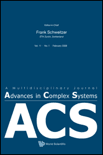
ADVANCES IN COMPLEX SYSTEMS
Fostering Research for a Complex WorldADVANCES IN COMPLEX SYSTEMS is a prominent journal dedicated to the multidisciplinary exploration of complex systems, published by World Scientific Publishing Co. PTE LTD in Singapore. With an ISSN of 0219-5259 and E-ISSN of 1793-6802, the journal has been a vital platform for researchers and professionals since its establishment in 2004, contributing to the field of Control and Systems Engineering as well as a broader multidisciplinary audience. The journal currently holds a respectable Scopus rank of #240/321 in Engineering Control and Systems Engineering, placing it in the 25th percentile and reinforcing its commitment to fostering innovative research. Although it does not operate under an open access model, the advances published within are essential for those seeking to understand and harness the complexities of system interactions. As it converges towards its upcoming milestone in 2024, ADVANCES IN COMPLEX SYSTEMS remains a crucial resource for scholars, providing insights and advancements that drive the understanding of complex phenomena across various domains.

BRITISH JOURNAL OF SOCIOLOGY
Fostering interdisciplinary dialogue for a deeper understanding of social phenomena.The British Journal of Sociology, published by Wiley, stands as a premier publication in the field of sociology, reflecting over five decades of scholarly discourse since its inception in 1965. With an impressive Q1 ranking in both Sociology and Political Science and a notable Scopus percentile of 84, it serves as a leading platform for innovative research and critical debates, drawing contributions from esteemed academics worldwide. Although it does not offer Open Access, the journal ensures that each issue is enriched with high-quality, peer-reviewed articles that advance understanding of social phenomena, making it indispensable for researchers, professionals, and students alike. The journal's mission is to foster interdisciplinary dialogue and facilitate new theoretical frameworks, thereby contributing to the evolution of sociological thought and practice. For those committed to exploring contemporary social issues, the British Journal of Sociology is an essential resource, promising to enhance your academic and professional endeavors.